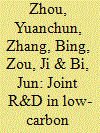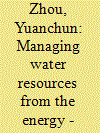| Srl | Item |
| 1 |
ID:
112892


|
|
|
|
|
| Publication |
2012.
|
| Summary/Abstract |
China faces the dual challenges of climate change and increased energy demand. These challenges in turn increase the demand for wind energy development. Along with rapid growth in manufacturing capacity, Chinese companies have aspired to increase their innovation capacity in order to enhance their competitiveness in the market. Joint research and development (R&D) is an attractive path for Chinese companies striving to advance their R&D capacity. This paper examines joint R&D between Chinese wind-turbine manufacturing companies and foreign design firms, assessing the performance of joint R&D activities in China using the structure-conduct-performance (SCP) framework. The study found that joint R&D has improved Chinese companies' technical capacity, human resources and financial growth. However, the effect on Chinese companies' innovation capacity is still limited because of unequal technical capacities of the two sides in collaboration, as well as their preference for augmenting profits rather than technical capacity. Current joint R&D mode is only the extension of licensing mode in wind-turbine manufacturing industry.
|
|
|
|
|
|
|
|
|
|
|
|
|
|
|
|
| 2 |
ID:
163555


|
|
|
|
|
| Summary/Abstract |
As one of the most developed provinces in China, Jiangsu province is facing both energy and water stresses. The impact of energy production on water resource remains to be seen, especially in terms of a changing climate. In this study, we adopt a Long-range Energy Alternatives Planning System (LEAP) model combined with plant-level data to study the impact of energy policies on water resources management. The results indicate that energy efficiency improvements and industry structure optimization can result in 40% and 33% water withdrawal savings respectively in the future depending on the level of optimization. With several integrated measures, total water use can meet the 2030 targets set by the Jiangsu provincial government. Shifts in cooling technology can bring significant water-savings benefits and help fulfill water use-control targets. Furthermore, we find that the Suzhou and Xuzhou administrative areas will experience power output efficiency reductions and will need more water in 2030 under the RCP45 and RCP85 scenarios. More efforts are needed to mitigate climate change and offset its negative impact on energy and water resource. The results of this study will be informative for both resource management and policy design.
|
|
|
|
|
|
|
|
|
|
|
|
|
|
|
|